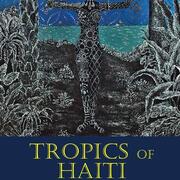Tropics of Haiti: Race and the Literary History of the Haitian Revolution in the Atlantic World by Marlene L. Daut was named as a 2016 Prose Awards Honorable Mention at the Association of American Publishers (AAP) Awards for Professional and Scholarly Excellence in the category of European/World History. The book also received 2016 Honorable Mention for the Gordon K. and Sybil Lewis Book Prize of the Caribbean Studies Association.
From the back cover:
The Haitian Revolution (1791-1804) was an event of monumental world-historical significance, and here, in the first systematic literary history of those events, Haiti's war of independence is examined through the eyes of its actual and imagined participants, observers, survivors, and cultural descendants. The 'transatlantic print culture' under discussion in this literary history reveals that enlightenment racial 'science' was the primary vehicle through which the Haitian Revolution was interpreted by nineteenth-century Haitians, Europeans, and U.S. Americans alike. Through its author's contention that the Haitian revolutionary wars were incessantly racialized by four constantly recurring tropes - the 'monstrous hybrid', the 'tropical temptress', the 'tragic mulatto/a', and the 'colored historian' - Tropics of Haiti shows the ways in which the nineteenth-century tendency to understand Haiti's revolution in primarily racial terms has affected present day demonizations of Haiti and Haitians. In the end, this new archive of Haitian revolutionary writing, much of which has until now remained unknown to the contemporary reading public, invites us to examine how nineteenth-century attempts to paint Haitian independence as the result of a racial revolution coincide with present-day desires to render insignificant and 'unthinkable' the second independent republic of the New World.
Reviews:
- "an ambitious project [...] Tropics of Haiti is an incredibly well-organized and meticulously researched work."--L'Esprit Créateur, Spring 2016.
- " [...] lengthy and impressive [....] Tropics of Haiti is part of a crucial wave of literary criticism that seeks to not only refocus our attention on nineteenth-century Haitian studies but expand the U.S. American literary canon and contribute to the transnational turn in American Studies by exposing cultural links across the Atlantic and the Caribbean. "--J. Michael Dash, Postcolonial Text, Spring 2017.
- "A literary tour-de-force, Daut's Tropics of Haiti offers an Atlantic counterpart to Edward Said's Orientalism (1978). [....] Her work proposes new directions not just for the study of Haiti but also race in the nineteenth-century Atlantic world." --Erin Zavitz, Small Axe, August 2017.
- "Rigorous and exacting, Daut insists that we confront our own racializing tendencies--that we put our scholarly praxis where our mouth is. Insofar as we embrace the notion that Haiti needs new narratives, we must applaud researchers like Marlene Daut who offer substantive means with which to rethink and rewrite our stories of the Haitian past."--Kaiama L. Glover, New West Indian Guide, 2017.
- "[A] masterful, extensive literary history of the Haitian Revolution....a transformative intervention on the narratives of women of color in colonial resistance and the Haitian Revolution--it is much needed (and much belated) and one hopes the first of many other similar investigations."--Chelsea Stieber, Early American Literature, 2017.
- "[An] impressive seven-hundred-page monograph, which, its physical heft notwithstanding, sustains throughout the imaginative energy, intellectual rigor, and charismatic tone of a 150-page manifesto."--RJ Boutelle, CLIO, 2017.
- "What makes Tropics of Haiti compelling is the daunting amount of research sources--primary and secondary, ranging from fiction to eighteenth-century historiography and reportage--that Daut brings into conversation. [...] The book is carefully organized to follow a historical trajectory that is intellectual, political, and literary. Yet the depth of its analyses and the fastidious contextualization make it readable in any number of ways and directions. [...] a remarkable source for studying both individual narratives and transnational intertextual relationships as Daut moves gracefully through the Atlantic world."--Journal of Haitian Studies, 2018.
- "This impressive volume is an extended, in-depth survey of the multiple reflections of 'racial' thinking that have haunted representations and assessments of Haitian literature and culture over time: from the origins of this discourse in biological pseudo-science to its ascriptions of revolution and bad governance to a biology of being. Formidable in its depth, breadth, and scope, it is arguably the most comprehensive study on this subject published to date."--Research in African Literatures, Spring 2019.


